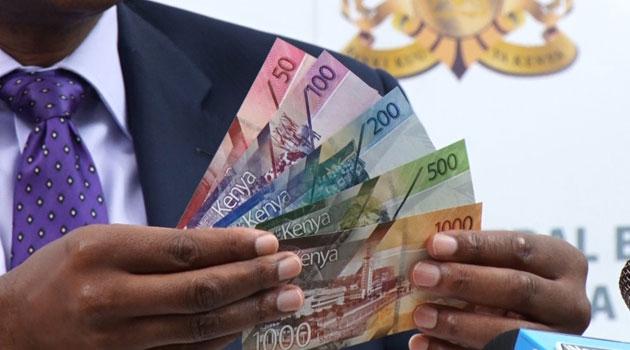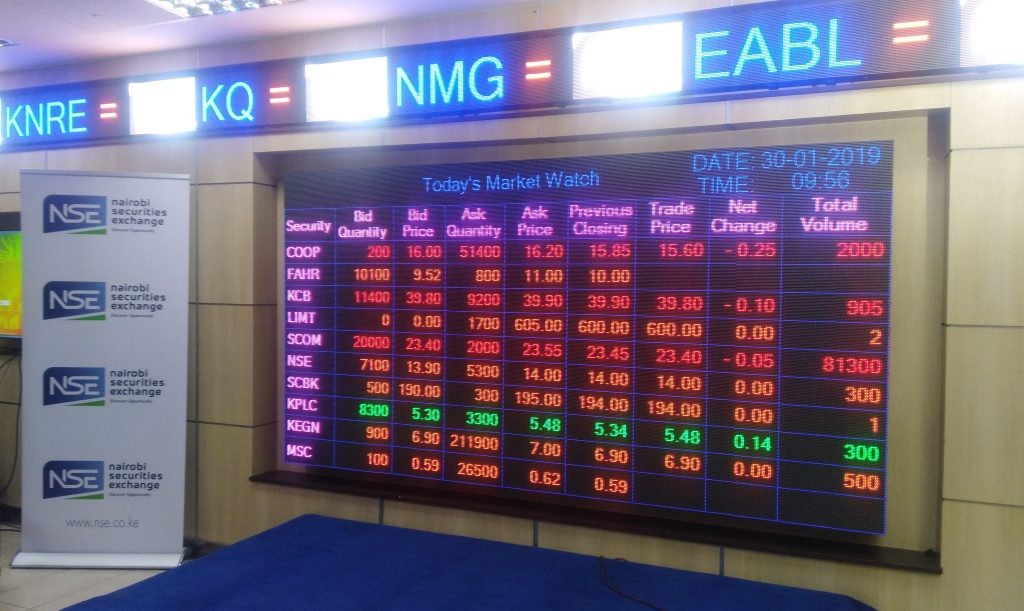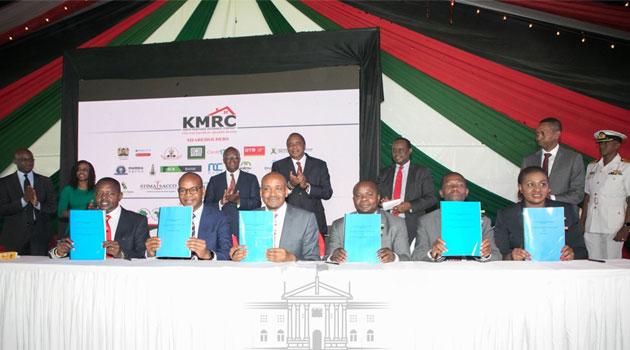- African Energy 2024: Surging investment, waves of change
- AIM Congress 2025: Competition opens doors for Africa’s top tech innovators
- Zimbabwe rolls out $24M project to reduce use of mercury in gold mines
- Zambia secures $184M IMF support as economic growth set to decline to 1.2 per cent
- Equity enters alliance with ODDO BHF to spur Europe-Africa investments
- Air Tanzania hits turbulence: Can the airline fly back to EU skies?
- Ghana’s President Elect John Mahama Outlines His Economic Blueprint
- AfDB backs “green shares” funding model with $30M AFC equity boost
Browsing: Central Bank of Kenya (CBK)
The Kenyan economy is projected to grow by 5.8 per cent on average in 2019, according to GDP projections from 16 research houses, global agencies, and government organizations that were tracked during the half-year period to June.
This will be driven by among others, growth in the agriculture sector, implementation of the Big 4 Agenda projects by the government, and recovery in the business environment evidenced by the Stanbic Bank Monthly Purchasing Managers’ Index (PMI), which rose to 51.3 in May 2019 from 49.3 recorded in April, an indication of improving business conditions.
Among firms that have projected the growth includes Cytonn Investment which had foreseen a 5.8 per cent growth in H1’2019 and a similar growth in the second half of the year.
“Cytonn maintains a positive outlook for the macroeconomic environment in Kenya in their H1’2019 review, with expectations of strong economic performance with a GDP growth of …
Kenya’s insurance sector has been rocked with controversies among them failure to meet contract obligations, exposing policy holders to risks rather than being cushioned as expected of indemnity.
In the latest twist of events, it has emerged that over ten insurance companies in Kenya are not paying claims, despite collecting billions in monthly premiums from their clients.
This has left hundreds of thousands exposed to risk while affected persons suffer despite having insurance covers.
There are 37 general insurance companies and 25 long term insurance companies, placing the total number of underwriters at 62.
The country’s insurance market has also been infiltrated by banks, which are offering insurance services under the ‘Bancassurance’ umbrella.
READ:What’s next for the insurance industry in Kenya?
Billions in premiums
According to official data by the industry regulator-Insurance Regulatory Authority (IRA), insurance industry gross premium written stood at Ksh216.37 billion (US$2.12billion) as at end of …
Global risk and information solutions provider—TransUnion has urged the use of credit scores for better loan product pricing.
With a keen focus on Kenya where the capping of interest has led to a credit crunch to private sector and households, TransUnion Kenya is urging lenders to focus on individual credit scores to make smarter decisions and empower consumers to take control of their financial health.
“With new risk-based pricing systems for loans on the horizon in Kenya, it’s becoming increasingly important for both consumers and financial institutions to understand how credit scores can help enable the right conversations,” the firm says in its latest market review on the East African country.
According to the firm, there is need for a new pricing system for interest rates (ether risk-based or not) to become increasingly clear.
“Many banks currently take a blanket approach to pricing,” says TransUnion Kenya CEO Billy Owino, “This …
The Kenya Shilling showed the first sign of loosing ground against major currencies since the Central Bank of Kenya introduced new notes and decided to recall the Ksh 1, 000 note in order to curb illicit flow.
Commercial banks have quoted the Shilling trading against the US dollar at Ksh 101.95/102.15 per dollar, compared with 101.80/102.00 at last week’s close. This weakening despite being marginal is the highest rate the currency has traded this year. (https://richmondartcenter.org/)
At the beginning of June, Central Bank of Kenya announced measures to introduce new currencies meeting a long overdue constitutional requirement to introduce new faces of the currency. In doing so, the CBK governor also announced that the Ksh 1,000 note in circulation was to be recalled and removed from the list of legal tender in Kenya due to illicit use in the country and the region.
Holders of the old …
Kenyan listed banks had an improved performance on aggregate in the first quarter of 2019 as they recorded improved profitability in a relatively tough operating environment, a survey by Cytonn Investment has revealed.
During the quarter, return on equity rose to 19.2 per cent from 18.4 per cent in Q1 2018, with equity group having the highest at 22.8 per cent, Cytonn’s Q1’2019 Banking Sector Review indicates.
The report, themed ‘Consolidation and Diversification to drive Growth’, analyzed the Q1’2019 results of the listed banks.
“We note that the increased emphasis on operating efficiency by banks seems to be bearing fruit, with the listed banking sector’s operating efficiency improving year-on-year, which was further supported by a recovery in interest revenue, largely supported by the asset re-allocation to government securities, and increased lending to specific segments”, said Caleb Mugendi, investment Associate at Cytonn Investments.
“The continued focus on alternative banking …
KCB Group shareholders have approved the proposal to acquire 100 per cent of the issued ordinary shares of National Bank of Kenya Limited (NBK) via share swap.
This approval follows the offer made by KCB Group on April 18, 2019 to acquire the shares of struggling NBK by way of a share swap of 10 ordinary shares of NBK for every one ordinary share of KCB. The transaction is subject to regulatory and NBK shareholders approvals.
The acquisition is part of KCB’s ongoing strategy to explore opportunities for new growth while investing in and maximizing the returns from its existing businesses, the management has said.
“For us, the acquisition is an opportunity to strengthen the deposit base and lending capacity, increase cost efficiencies due to economies of scale and boost transactional revenue through leveraging of technology. NBK maintains a strong deposit franchise and a wide branch network,” said KCB
Group …
After more than three years of waiting, the Nairobi Securities Exchange (NSE) has received regulatory approvals to proceed with the launch of the derivatives market.
This follows the successful conclusion of the Derivatives Market Pilot Test and subsequent submissions to the Capital Markets Authority (CMA) and the Central Bank of Kenya (CBK).
READ:Investors to commence derivatives trading at Nairobi bourse
NSE now sees the launch of the Derivatives Market as a significant milestone in the growth and deepening of the country’s’ capital markets and the wider Kenyan economy.
“Derivatives Markets provide new opportunities to investors, enabling them to better diversify their portfolios and allow for the efficient deployment of capital. Furthermore, through the Derivatives Market, investors will be able to form expectations about underlying assets in order to manage the price risks,” NSE Chief executive Geoffrey Odundo has noted.
This initiative makes the NSE the second African Exchange to …
The World Bank Board of Directors has approved a US$750 million (Ksh75.9 billion) International Development Association (IDA) credit for Kenya, in the latest move by the global lender to channel funds to the East Africa State.
A member of the World Bank Group headquartered in Washington D.C, IDA is an international financial institution which offers concessional loans and grants to the world’s poorest developing countries
The loan comes amid concerns over the country’s ballooning public debt which crossed the Ksh5.1 trillion (US$50.4 billion) mark in September 2018, with possibilities of going Ksh5.6 trillion (US$55.4 billion by close of the year.
READ:Tough times: Kenya piles Kshs 2.5 billion debt in a day
On Tuesday, Central Bank of Kenya (CBK) governor Patrick Njoroge said the country’s headroom for new borrowing has shrunk since it tapped the US$2.1 billion Eurobond earlier this month, which part of it has gone towards debt refinancing. …
In yet another review of the country’s macroeconomics, Kenya’s Central Bank has held the benchmark lending rate at 9 per cent, meaning banks in the country will continue giving loans with a maximum interest rate of 13 per cent.
This is under the Banking Act which caps lending rates at four percentage points above the CBK rate.
The decision was reached on Monday by CBK’s decision making organ-Monetary Policy Committee (MPC), which meets every two months to review the outcome of its previous policy decisions and recent economic developments.
The meeting was held against a backdrop of domestic macroeconomic stability, sustained optimism on the economic growth prospects, improving weather conditions in most parts of the country and increased uncertainties in the global financial markets.
This is the sixth time the MPC is retaining the benchmark rate at nine per cent after bringing it down from 9.5 per cent in July …
Kenya has unveiled a mortgage refining facility-Kenya Mortgage Refinance Company (KMRC), a short in the arm in President Uhuru Kenyatta’s affordable housing scheme under the Big Four Agenda.
KMRC is a non- deposit taking financial institution under the supervision of the Central Bank of Kenya (CBK).
The company was incorporated on April 19, 2018 with the single purpose of providing long-term funds to primary mortgage lenders (banks, micro finance banks and saccos) in order to increase the availability and affordability of mortgage loans to Kenyans.
READ:Mortgages more unaffordable as Kenya house prices increase in 2018
KMRC shareholders and funding
The company was established as a private public investment with majority ownership by the private sector at 80 per cent and government 20 per cent. Its current shareholders comprise: the national treasury and planning; eight (8) commercial banks; eleven (11) deposit taking Savings and Credit Co-operatives (Saccos) and one (1) …












